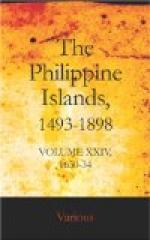came to manage the affair, namely, Father Moregon—a
Castilian, but so changed into a Portuguese by his
long intercourse with them, that he did nothing without
them. Nothing was concluded upon this occasion.
Later, in the year 1631, two junks came from Japon,
one Portuguese, the other Japanese, with an embassy.
The governor granted them audience in very circumspect
fashion. On that occasion he assembled all the
infantry in two columns, and had them escort the Japanese
who acted as ambassadors, to whom he gave horses and
trappings and a fine carriage. In short, they
had come, in behalf of the governor of Nangasaqui,
to confer about the junk, and the means by which trade
could be opened. But it was straitly stipulated
that no religious should go, for the Japanese had no
liking for them. Two of our Japanese friars were
the translators of all the matter contained in the
letters. The governor satisfied them in everything,
and treated them very well in Manila. The religious
took the greatest pleasure from the embassy, considering
the power of God. For when that gate was, in
man’s judgment, most tightly locked, the Lord
opened it. For naught is impossible to Him.
Non
erit impossibile apud Deum omne verbum. [81] He
who brought the Magian kings to the feet of One newly-born,
by following a star, that same One brings the other
nations to His bosom, when He wills, and opens the
door to them so that they may enter into the bosom
of His Church. The religious had the greatest
hope of seeing the doors of Japon opened widely, so
that those harvests might be gathered. The Lord,
then, has been well pleased in those kingdoms with
so much blood as has been shed there by His faithful
ones, in testimony of His holy law. May He act
as He shall see best in this matter.
It appears that in the year 1629 the orders were moved
to send religious to Japon at their own cost.
These were the Dominican fathers, the Franciscans,
our Recollects, and those of our own order. They
furnished the expenses on shares, built a champan,
hired sailors, and paid a pilot. But that expedition
could not have been for the best, for the Lord proceeded
to defeat it, by allowing their champan to be wrecked.
Afterward, although they bought another in China (or
rather in Ilocos), it had no better success.
Ours spent more than five hundred pesos. The
father reader, Fray Pedro de Quesada, [82] and father
Fray Agustin de Chauru went. The sufferings of
the religious from storms, rains, roads, and famines
would not be believed. It seems that they can
say with St. Paul: Omnia superamus propter
eum qui dilexit nos. [83] They had to return because
their superiors thus ordered, for in any other way
they would not have done it; as they know very well
how to suffer with Christ and for Christ, whose hardships
were sweet to them, as to another St. Paul: Mihi
autem absit gloriari nisi in cruce Domini nostri Jesu
Christi. [84]




